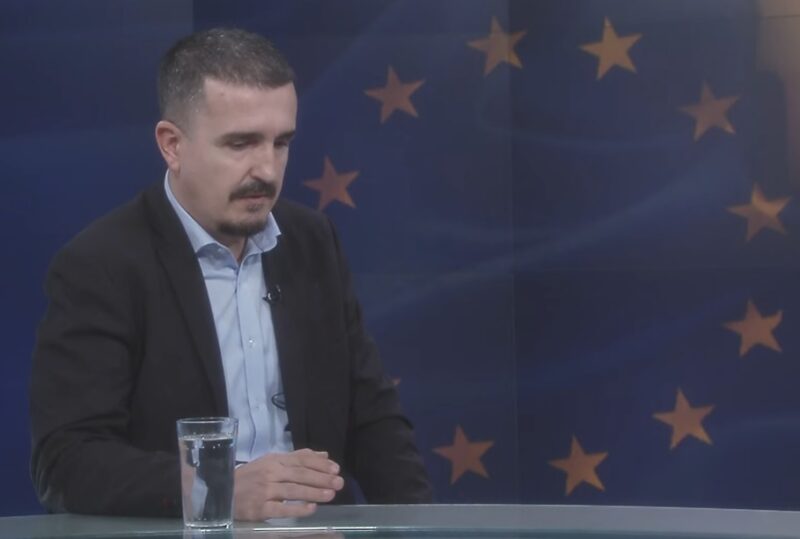Although the new majority was expected to number 69, the minus of 4 deputies consists of two DUI deputies and one independent, who together function within the “Fire Group” faction, and one DS party deputy. This reshuffle did not secure a strong majority, but it is stable enough for this government to complete its mandate for the first time since 2006. But there is one more snag where the government could topple…
Author: Xhelal Neziri
Formed during the height of the pandemic in 2020, this government composition will be remembered for the frequent changes of ministers and coalition partners. From the total number of members (21), even half of them have been replaced for three years, including a prime minister. By the end of the mandate in 2024, the current prime minister is also expected to change, after in the last three months the first position in the government will go to DUI, according to the governance agreement that this party has with SDSM.
In this three-year period, there has been a ” fog” in front of the gates of the government regarding the entrances and exits of political parties. At the beginning of the mandate in 2020, BESA was part of the government as a partner of the pre-election coalition of SDSM. A year later, in 2021, BESA leaves the government to enter Alternative. After less than two years, Alternativa leaves the government to be joined by the Alliance for Albanians (AA).
All these movements come in a period of unstable political extremes, on the eve of the Third World War. The Russian aggression against Ukraine had a negative impact not only on the economic level, but also on the internal political situation in the countries of Europe. As NATO’s newest member, which aligned itself strongly with the West, North Macedonia was certainly not spared from the damaging influences. These harmful influences no doubt contributed to this course of events within, where politics is not seen as an arena for the articulation of voters’ interests, but only as a way to obtain power and money.
This continuous political earthquake was happening even at the time when the problem between Kosovo and Serbia was being pushed towards a solution. Belgrade and Pristina faced intense international pressure to reach an agreement, proposed by France and Germany and supported by the EU and the US, to “dismantle” the latest “bomb” in the troubled Western Balkans. This pressure made the parties accept solutions that in the past were the main material for building populist narratives in both countries: Serbia should really recognize Kosovo and Kosovo should create a community of Serbian municipalities.
This process can become a topic or material for political subjects outside of Kosovo or Serbia. After being found in the opposition, Alternativa came up with the idea of applying the “union of municipalities” model to ethnic Albanians in North Macedonia as well. Not only with this proposal, but for years a completely wrong parallel has been drawn between the rights and the percentage of the ethnic Serbs in Kosovo and those of the ethnic Albanians in North Macedonia. The rights of ethnic Serbs in Kosovo are the result of negotiations between two states, which do not recognize each other, while the rights of ethnic Albanians in North Macedonia are the epilogue of an internal political process with features that cannot be compared to the countries of others. Personally, I am surprised by the tendency to copy bad solutions from the neighborhood and sell them locally as good ones. It would be best if Alternative had offered the Ohrid Agreement as a solution to the internal situation in Kosovo, but even in this case this solution is inapplicable there due to the particularities of the Belgrade-Pristina dispute. Unlike Northwestern Macedonia, the ethnic Serb-majority municipalities in northern Kosovo are geographically compact, almost monoethnic, and have separatist tendencies encouraged by Belgrade. That reality is not present here, where out of a total of 80 municipalities, ethnic Albanians are the majority in 15, while in 19 they are over 20 percent. Finally, such a model would annul the Ohrid Framework Agreement, which clearly states that there will be no territorial solution to ethnic issues. In a word, such an idea is out of time and space as today the country is a member of NATO, and the main challenge is integration into the EU.
However, the vote of the new government showed that it relies on a parliamentary majority of 65 deputies. One more than the previous majority, the one with the Alternative and without the Alliance for Albanians. The first came out with 4, the second came in with 8 deputies. Although the new majority was expected to number 69, the minus of 4 deputies consists of two DUI deputies and one independent, who together function within the “Fire Group” faction, and one DS party deputy. This reshuffle did not secure a strong majority, but it is stable enough for this government to complete its mandate for the first time since 2006. But there is one obstacle where the government could fall: constitutional changes to include ethnic Bulgarians in the Constitution, as a task undertaken last year with the French Proposal, which removed the veto for negotiations with the EU.

